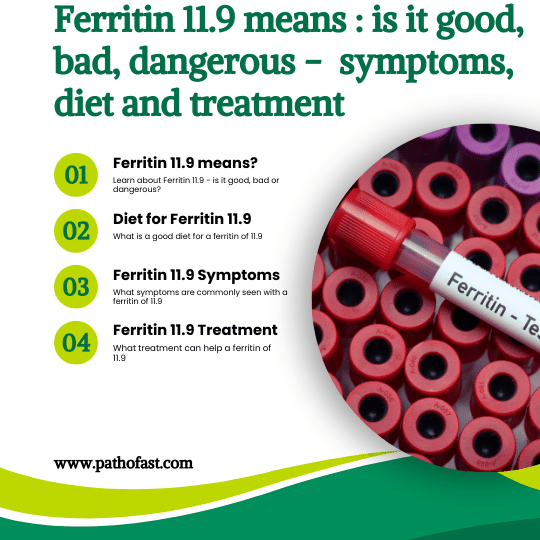
Ferritin 11.9 means : Is it normal, good, bad or dangerous
In this article we discuss what a Ferritin of 11.9 means, together with its causes, and whether it is good, bad or normal. We also look into the significance of Ferritin 11.9 in pregnancy.
Published Date : 2024-04-09T19:24:21.681Z
Updated Date : 2024-04-09T19:24:21.681+00:00
Table of Contents
What is Ferritin?
How is Ferritin measured?
What are the causes of ferritin of 11.9?
What is the normal range of Ferritin and how is a Ferritin of 11.9 graded?
What does a ferritin level of 11.9 mean?
What foods will help increase a ferritin of 11.9?
Suggest a weekly diet plan for increasing ferritin levels of 11.9
What are some symptoms of a ferritin of 11.9 ?
What is Ferritin?
Ferritin is a vital protein responsible for iron storage. It is produced in organs like the liver and spleen. Iron-rich foods like lean meats, nuts, and fortified cereals contribute to ferritin levels. Its main function is to store iron safely, releasing it when the body requires iron for tasks like making red blood cells.
How is Ferritin measured?
To measure ferritin, a blood sample is collected, with fasting recommended for preparation. In labs, techniques like radioimmunoassay (RIA) or electrochemiluminescence immunoassay (ECLIA) are commonly used to accurately quantify ferritin levels in the blood.
What are the causes of ferritin of 11.9?
Ferritin of 11.9 have different causes, as listed below.
Thyroid Disorders
Conditions like hypothyroidism can affect iron metabolism, resulting in low serum ferritin levels and contributing to iron deficiency.
Hereditary Hemochromatosis
Hereditary hemochromatosis is a genetic disorder that causes excessive iron absorption, leading to iron overload and subsequent low serum ferritin levels.
Malabsorption Disorders
Conditions like celiac disease, Crohn's disease, or inflammatory bowel disease can impair the absorption of iron, contributing to low serum ferritin levels.
Medications
Certain medications, such as proton pump inhibitors or antacids, can interfere with iron absorption, leading to low serum ferritin levels.
Pregnancy
Increased iron demand during pregnancy may result in low serum ferritin levels if dietary intake is not adequately supplemented to meet the heightened requirements.
Gastric Bypass Surgery
Surgical procedures that alter the digestive system, such as gastric bypass surgery, can impact iron absorption, leading to low serum ferritin levels.
Iron Deficiency Anemia
Iron deficiency anemia is the most common cause of low serum ferritin levels, indicating a shortage of iron to produce sufficient hemoglobin. This condition often results from inadequate iron intake or absorption.
Chronic Kidney Disease
Impaired production of erythropoietin in chronic kidney disease can contribute to anemia and low serum ferritin levels.
Inadequate Dietary Iron Intake
Low consumption of iron-rich foods, such as red meat, poultry, fish, or iron-fortified foods, can lead to insufficient iron levels and a decline in serum ferritin.
Helicobacter Pylori Infection
Infection with H. pylori in the stomach may lead to gastritis and impaired iron absorption, contributing to low serum ferritin levels.
What is the normal range of Ferritin and how is a Ferritin of 11.9 graded?
Normal Ranges of Ferritin vary according to the age and gender. The ranges are considerably different in adults, children and pregnant women. Refer to the tables below for your exact range.
What are the normal ranges in children?
| Age Range | Reference Range (ug/L) | Is your child deficient? |
|---|---|---|
| 4 to 15 days | 99.6 - 717.0 | If your child is aged between 4 days - 15 days, a ferritin level of 11.9 is lower than normal. |
| 15 days to 6 months | 14.0 - 647.2 | If your child is aged between 15 days - 6 months, a ferritin level of 11.9 is lower than normal. |
| 6 months to 1 year | 8.4 - 181.9 | If your child is aged between 6 months - 1 year, a ferritin level of 11.9 is within normal limits |
| 1 to 5 years | 5.3 - 99.9 | If your child is aged between 1 year - 5 years, a ferritin level of 11.9 is within normal limits |
| 5 to 14 years | 13.7 - 78.8 | If your child is aged between 5 years - 14 years, a ferritin level of 11.9 is lower than normal. |
Reference : Ferritin normal ranges in children.
What are the normal ranges of ferritin in pregnancy?
| Range | Inference | Ferritin : 11.9 |
|---|---|---|
| <12 | Low Ferritin - Anemia | |
| 12 to 45 | Normal Ferritin | You are here |
| More than 45 | High Ferritin - Could lead to diabetes in pregnancy |
Reference : Ferritin and Anemia in PregnancyGestational Diabetes Mellitus and relation to Ferritin
What are the normal ranges in adult men?
| Range | Inference | Ferritin : 11.9 |
|---|---|---|
| <15 | Low Ferritin - Anemia | You are here |
| >15 - 35 | Below Normal but not anemia | |
| 35 - 220 | Normal | |
| >220 | Higher than normal |
Reference : Ferritin Reference Ranges in Adults
What are the normal ranges in adult women?
| Range | Inference | Ferritin : 11.9 |
|---|---|---|
| <15 | Low Ferritin - Anemia | You are here |
| 15 to 136 | Normal Ferritin | |
| More than 136 | High Ferritin |
Reference : Ferritin Reference Ranges in Adults
What does a ferritin level of 11.9 mean?
A level of ferritin 11.9 is considered to be below normal, and it means that your body has insufficient stores of iron. Ferritin is the storage form of iron in the human body and its value typically reflects how much iron we have. A value of 11.9 means that you dont have sufficient iron stores.
Is ferritin 11.9 good?
Ferritin 11.9 is borderline and may be accompanied by iron deficieny.
Is ferritin 11.9 bad?
Ferritin 11.9 is not bad, but needs further investigation
Is ferritin 11.9 dangerous?
Ferritin 11.9 is not dangerous, but needs further investigation
Is ferritin 11.9 low?
Ferritin 11.9 is borderline low, and may or may not be accompanied with iron deficiency symptoms.
What foods will help increase a ferritin of 11.9?
The following list of foods can help boost ferritin levels of 11.9. However, it is important to remember that
Breakfast cereals, fortified with 100% of the DV for iron
Consider getting upto 1 serving per day.
Oysters, eastern, cooked with moist heat
Consider getting upto 3 ounces per day.
White beans, canned
Consider getting upto 1 cup per day.
Beef liver, pan-fried
Consider getting upto 3 ounces per day.
Nuts, pistachio, dry roasted
Consider getting upto 1 ounce (49 nuts) per day.
Tofu, firm
Consider getting upto ½ cup per day.
Cheese, cheddar
Consider getting upto 1.5 ounces per day.
Milk
Consider getting upto 1 cup per day.
Raisins, seedless
Consider getting upto ¼ cup per day.
Suggest a weekly diet plan for increasing ferritin levels of 11.9
Low levels of ferritin cannot be managed by diet alone. More often that not, iron supplments are required. Consult your doctor for appropriate medical advice. The following diet plans may help to supplement iron in your food.
Monday
Diet Plan to improve ferritin of 11.9
| Breakfast | Lunch | Dinner |
|---|---|---|
| Breakfast cereal fortified with 100% DV for iron | Tomato (canned, stewed, ½ cup) | Beef liver (pan-fried, 3 ounces) |
Tuesday
Diet Plan to improve ferritin of 11.9
| Breakfast | Lunch | Dinner |
|---|---|---|
| Breakfast cereal fortified with 100% DV for iron | Tomato (canned, stewed, ½ cup) | Oysters, eastern, cooked with moist heat, 3 ounces |
Wednesday
Diet Plan to improve ferritin of 11.9
| Breakfast | Lunch | Dinner |
|---|---|---|
| Breakfast cereal fortified with 100% DV for iron | Spinach (boiled and drained, ½ cup) | Spinach (boiled and drained, ½ cup) |
Thursday
Diet Plan to improve ferritin of 11.9
| Breakfast | Lunch | Dinner |
|---|---|---|
| Breakfast cereal fortified with 100% DV for iron | Chocolate, dark, 45%–69% cacao solids, 1 ounce | Beef liver (pan-fried, 3 ounces) |
Friday
Diet Plan to improve ferritin of 11.9
| Breakfast | Lunch | Dinner |
|---|---|---|
| Lentils (boiled and drained, ½ cup) | Spinach (boiled and drained, ½ cup) | Spinach (boiled and drained, ½ cup) |
Saturday
Diet Plan to improve ferritin of 11.9
| Breakfast | Lunch | Dinner |
|---|---|---|
| Breakfast cereal fortified with 100% DV for iron | Chickpeas (boiled and drained, ½ cup) | Beef, braised bottom round, trimmed to 1/8" fat, 3 ounces |
Sunday
Diet Plan to improve ferritin of 11.9
| Breakfast | Lunch | Dinner |
|---|---|---|
| Tofu (firm, ½ cup) | Tomato (canned, stewed, ½ cup) | Spinach (boiled and drained, ½ cup) |
What are some symptoms of a ferritin of 11.9 ?
A ferritin of 11.9 will usually show symptoms of iron deficiency. These will include various symptoms including those listed below.
Fatigue
Feeling tired and lacking energy
Difficulty swallowing
Feeling of obstruction or discomfort when swallowing
Poor appetite
Reduced desire to eat or loss of appetite
Heart palpitations
Sensation of rapid or irregular heartbeat
Weakness
Decreased strength and stamina
Hair loss
Experiencing hair thinning or shedding
Restless legs syndrome
Uncomfortable sensations in the legs, especially at night
Shortness of breath
Difficulty breathing or feeling breathless
Pica
Eating non-food items like ice, dirt, or clay
Frequent infections
Increased susceptibility to infections

